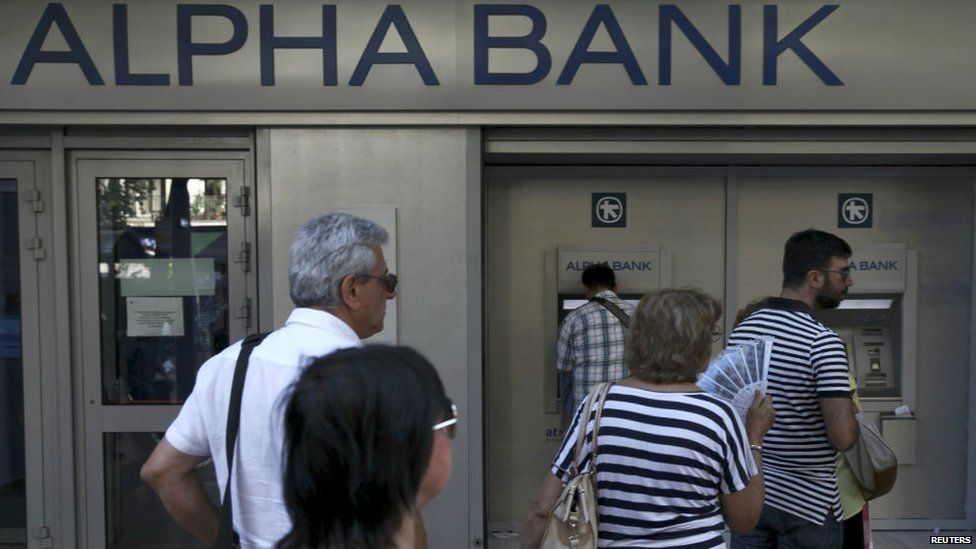-
16 July 2015
- From the section Europe

Greek banks, which shut nearly three weeks ago, are due to reopen on Monday after the European Central Bank (ECB) raised the level of emergency funding available.
However, credit controls limiting cash withdrawals to €60 (£41) a day will only be eased gradually, officials say.
Earlier, eurozone ministers also agreed a €7bn (£5bn) bridging loan from an EU-wide fund to keep finances afloat.
On Friday, the German parliament will vote on a new bailout for Greece.
Although Greece has a conditional agreement to receive up to €86bn (£61bn) over three years, some eurozone states still need to give the green light.
The closure of Greece’s banks has been one of the most visible signs of the country’s financial crisis.
The country has debts of €320bn and is seeking its third international bailout. Last month it became the first developed country to fail to make a repayment to the IMF.
“From Monday, the services offered will be widened. All the banks everywhere will be open,” Deputy Finance Minister Dimitris Mardas told ERT television.
He said there might be a weekly limit on withdrawals, rather than a daily one.
“If someone doesn’t want to take €60 on Monday and wants to take it on Tuesday, for instance, they can withdraw €120, or €180 on Wednesday,” he said.
“This is a proposal we are processing and we think it’s technically possible.”
The announcements from the ECB and the Eurogroup came after Greek MPs passed tough reforms as part of the new bailout deal.
Analysis by Chris Morris, BBC Europe correspondent
The European institutions are now picking up the pace to make sure this rather chaotic show stays on the road.
There’s more emergency funding for Greek banks from the ECB. And agreement on a €7bn bridging loan from the EFSM to get the Greek state through the next few days.
Greece needs to repay €4.2bn euros to the ECB on Monday, as well as making up all its missed payments to the IMF. In other words it needs to spend the €7bn almost as soon as it gets it.
Some creative financial engineering has ensured that short-term funding from the EFSM will get final approval tomorrow. And then attention will turn to negotiations on the three-year bailout programme that Greece has applied for.
Those negotiations are likely to last for weeks, and plenty of things can still go wrong.
There’s scepticism in Greece that the deal is too tough; scepticism elsewhere that it isn’t tough enough.
German Finance Minister Wolfgang Schaeuble has repeated his suggestion that maybe a “time-out” from the eurozone would be the best thing for Greece.
It is pretty unprecedented language. And it suggests that the battle to keep Greece in the eurozone is far from over.
ECB President Mario Draghi told a news conference that emergency funding – ELA – to Greek banks was being raised by €900m over one week.
“Things have changed now,” he said. “We had a series of news with the approval of the bridge financing package, with the votes, various votes in various parliaments, which have now restored the conditions for a raise in ELA.”
The €7bn bridging loan means Greece will be able to repay debts to the ECB and IMF on Monday.
It was agreed in a conference call on Thursday to tap the EU’s EFSM emergency fund and is expected to be confirmed on Friday by all EU member states.
The move had angered some EU members who are not in the single currency, but on Thursday the UK said it had won an agreement to protect its contribution in the EFSM.
UK Chancellor of the Exchequer George Osborne said the concession would also apply to other non-eurozone EU states.
Greek Prime Minister Alexis Tsipras won the parliamentary vote in the early hours of Thursday by 229 votes to 64, but needed the support of opposition MPs to do so.
What happens next?
- EU member states to back eurozone decision on €7bn bridging loan to clear Greece’s immediate debts (expected Friday)
- German parliament to back negotiations on €86bn eurozone bailout deal (Friday)
- Greek parliament to pass further reforms (22 July)
- Lengthy eurozone talks to start on bailout through European Stability Mechanism
There were angry protests in the streets of Athens by many who believe Greece has conceded too much to its creditors to win the bailout.
Mr Tsipras’s left-wing Syriza-led government is expected to survive, despite losing its majority after 38 Syriza MPs rejected the reforms.
He is expected to reshuffle his cabinet in the near future.
The vote in the early hours of Thursday approved:
- VAT changes including a top rate of 23% to take in processed food and restaurants; a 13% rate to cover fresh food, energy bills, water and hotel stays; and a 6% rate for medicines and books
- An increase in corporation tax from 26% to 29% for small companies
- An increase in luxury taxes on big cars, boats and swimming pools
- An end to early retirement by 2022, increasing the retirement age to 67
By 22 July, Greece must also commit to a major overhaul of the civil justice system. It has to agree to more privatisation, to review collective bargaining and industrial action, and make market reforms, including relaxing Sunday trading.
The vote paved the way for eurozone finance ministers to open detailed talks on the bailout and on Thursday they said they agreed “in principle” to start negotiations.


